Health Benefits of Hiking: 10 Reasons to Hit the Trails
Health Benefits of Hiking: Understanding the Physical Benefits
Are you looking for a fun and rewarding way to improve your overall health? Look no further than hiking! This popular activity offers a multitude of benefits for your body workout and can positively impact both your physical and mental well-being.
Whether you’re young or old, hiking in national parks is an excellent way to boost your cardiovascular health, lower the risk of heart disease, and increase your overall fitness level. Additionally, spending time in nature can also provide the benefits of forest bathing, which has been shown to reduce high blood pressure.

Not only does hiking provide a full body workout, but it also offers many health benefits. Studies have shown that just one hour of hiking can burn up to 500 calories, making it an effective way to manage weight and reduce symptoms of various diseases such as arthritis.
Additionally, hiking in nature, also known as forest bathing, can lower blood pressure and improve insulin sensitivity. So lace up your boots and hit the trails for a refreshing workout that benefits both body and mind. You only need a few minutes to start reaping the rewards.
So why wait? Lace up those boots, hit the forest trails, and start reaping the incredible health benefits that hiking in nature has to offer. It’s time to embrace an active lifestyle and discover how this simple yet invigorating activity can enhance your quality of sleep and overall well-being.
Physical Benefits of Hiking:
Burn calories and improve cardiovascular fitness while enjoying the great outdoors.
Hiking for an hour is not only a great way to explore nature, but it also offers numerous physical benefits such as burning calories and improving cardiovascular fitness. Unlike traditional workouts in a gym, hiking allows you to enjoy the beauty of nature while engaging in physical exercise.
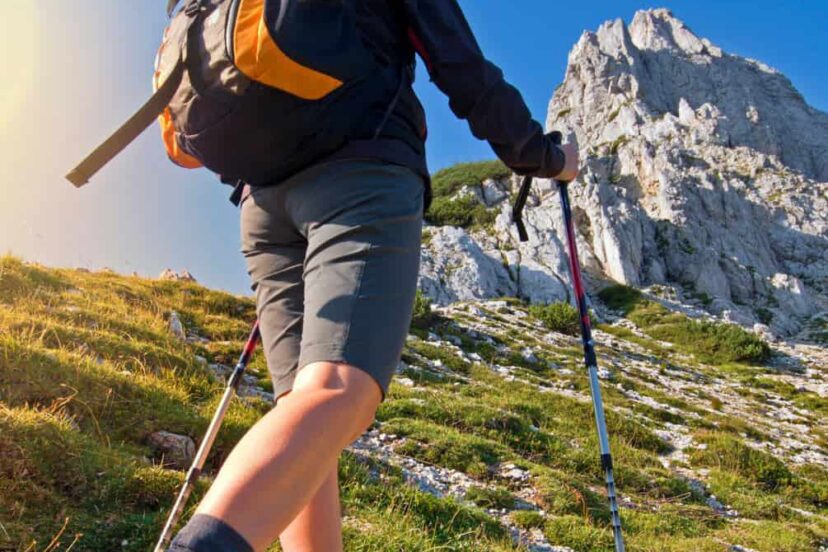
While hiking, your body is constantly in motion, which helps increase your heart rate and burn calories. According to research, an hour-long hike can burn up to 500 calories for an average individual, providing many health benefits.
This calorie-burning activity can contribute significantly to weight loss and weight management goals, as well as improve sleep and overall well-being.
Strengthen muscles, including your legs, core, and glutes, through regular hiking.
Another key physical benefit of is its ability to strengthen various muscle groups in your body. Regular hiking engages many muscle groups simultaneously, leading to improved overall strength and endurance. Hiking for an hour can provide rei health benefits.

During a hike, your leg muscles work hard for hours as you propel yourself uphill or stabilize on uneven terrain. The constant movement on different surfaces also engages your core muscles, aiding in balance and stability.
Hiking uphill or climbing steep paths specifically targets your gluteal muscles, helping to tone and strengthen them over time. REI is a great place to find hiking gear and equipment for your next adventure.
Enhance flexibility and joint mobility by navigating different terrains while hiking.
Hiking with REI involves navigating various terrains such as rocky trails or uneven surfaces. This constant adaptation challenges your body’s flexibility and joint mobility.
As you step over rocks or maneuver around obstacles, your joints go through a wide range of motions that enhance their flexibility over time.
Regular hiking can also help prevent joint stiffness by improving lubrication within the REI joints themselves.
By keeping your joints active through this low-impact activity, you reduce the risk of developing conditions like arthritis or experiencing discomfort associated with sedentary lifestyles.
Mental and Emotional Benefits of Hiking:
Reduce stress levels and boost mood with the help of nature’s calming influence during hikes.
When was the last time you felt stressed out? Maybe it was after a long day at work or dealing with the pressures of everyday life.
Well, here’s some good news: hiking can actually help reduce those stress levels and improve your overall mood. Hiking is a great way to enjoy the outdoors and take advantage of the benefits of nature. So, whether you’re an experienced hiker or just starting out, consider adding hiking to your list of outdoor activities to try.

Being out in nature has a way of soothing our minds and bodies. The fresh air, the sounds of birds chirping, and the beautiful scenery all contribute to a sense of calmness that is hard to find elsewhere.
When we hike, we are able to disconnect from our daily worries and immerse ourselves in the present moment. This helps us let go of stress and allows us to focus on the beauty around us.
Improve cognitive function, memory, and focus through regular engagement in outdoor activities like hiking.
Have you ever noticed how clear your mind feels after a hike? That’s because hiking has been shown to improve cognitive function, memory, and focus.
When we engage in physical activity like hiking, our brain gets a boost of oxygen-rich blood flow which enhances its performance.

Not only does hiking stimulate our brain cells but it also helps create new connections between them. This improves our ability to remember things and stay focused on tasks at hand. So if you’re struggling with concentration or forgetfulness, consider hitting the trails for some mental rejuvenation.
Experience a sense of accomplishment and increased self-confidence as you conquer new trails.
There’s nothing quite like the feeling of accomplishment when you reach the top of a challenging trail. It’s as if every step taken brings you closer to conquering not just the mountain but also your own fears and limitations. Hiking provides an opportunity for personal growth by pushing us outside our comfort zones.
As we tackle difficult terrains or overcome physical obstacles along the way, we build resilience both physically and mentally. This sense of achievement boosts our self-confidence and reminds us that we are capable of more than we think. So lace up your hiking boots, hit the trails, and let your confidence soar.
Social Benefits of Hiking:
Connect with like-minded individuals
Hiking offers a fantastic opportunity to connect with like-minded individuals who share your passion for exploring the great outdoors. Whether you’re a beginner or an experienced hiker, there are local or organized hiking groups that cater to all skill levels.
By joining these groups, you can meet fellow adventurers who are just as enthusiastic about hiking as you are. Sharing experiences and tips with others who understand the thrill of conquering new trails can be incredibly rewarding.
Foster new friendships
Participating in group hikes or joining outdoor clubs in your community opens up doors to foster new friendships. These shared experiences create a strong bond among hikers, leading to lasting connections beyond the trails.
Engaging in conversations during hikes allows you to get to know people on a deeper level, building genuine friendships based on common interests and shared adventures.

Enjoy quality time with loved ones
Hiking is not only a solo activity; it’s also an excellent way to spend quality time with family and friends. Exploring scenic trails together provides an opportunity for meaningful bonding while immersing yourselves in nature’s beauty.
Leave behind the distractions of everyday life and embark on memorable journeys with your loved ones. Create lasting memories as you conquer challenging terrains or simply enjoy leisurely walks through picturesque landscapes.
To make the most out of the social benefits of hiking, consider incorporating social media into your hiking adventures:
Share your hiking experiences: Use platforms like Instagram or Facebook to showcase stunning photos from your hikes and share stories about memorable moments along the way.
Join online hiking communities: Participate in online forums or Facebook groups dedicated to hiking enthusiasts. Engage in discussions, seek advice, and find inspiration from fellow hikers worldwide.
Organize group hikes: Utilize social media platforms to organize group hikes in your area. Invite friends, family, and even strangers who share an interest in exploring nature. This way, you can connect with new people and expand your hiking circle.
By leveraging social media, you can enhance your hiking experiences and connect with a broader community of outdoor enthusiasts who share your love for the trails.
Remember, hiking is not just about the physical health benefits; it’s also about fostering connections and building relationships.
So, lace up your boots, invite friends or family, and embark on an adventure that will not only boost your well-being but also create lasting memories with like-minded individuals. Happy hiking!
Boost Your Self-Esteem with Hiking:
Overcome Challenges and Build Resilience
Hiking is more than just a walk in the park – it’s an opportunity to push yourself beyond your limits and overcome challenges. Taking on difficult trails can be daunting, but as you navigate through rugged terrains and conquer steep inclines, you’ll find that each obstacle you overcome adds to your resilience.
The sense of accomplishment that comes from conquering these challenges can have a profound impact on your self-esteem.

Achieve Personal Goals and Boost Confidence
Setting personal goals is a great way to stay motivated and track your progress. Hiking provides the perfect platform to set and achieve these goals. Whether it’s completing longer hikes or conquering steeper inclines, every milestone reached boosts your confidence levels.
As you push yourself further, you’ll realize that with determination and perseverance, you are capable of achieving anything you set your mind to.
Embrace Empowerment Beyond Comfort Zones
Stepping out of our comfort zones is where true growth happens. Challenging hikes provide an opportunity to embrace empowerment by venturing into unfamiliar territory. When faced with difficult trails, we often discover hidden strengths within ourselves that we never knew existed.
Pushing through physical and mental barriers during challenging hikes not only builds character but also instills a sense of empowerment that transcends beyond the trail.
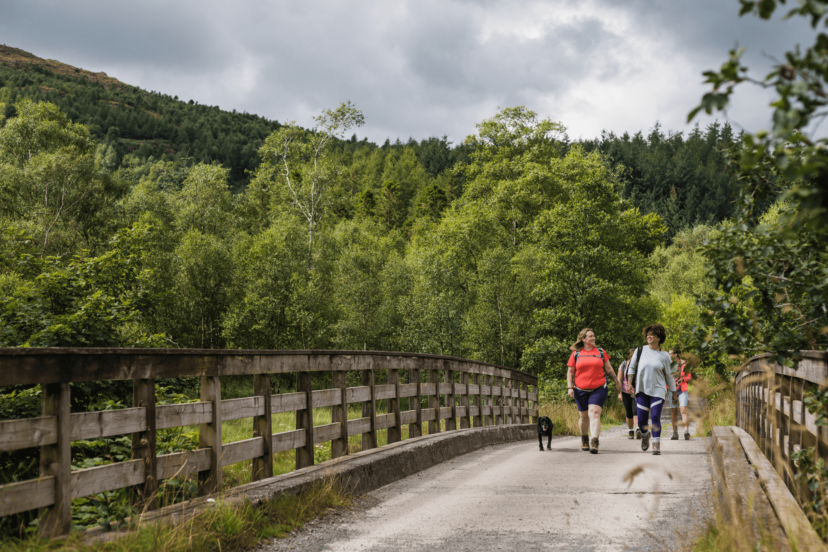
When hiking, remember:
Take on challenging trails that push your limits.
Break down larger goals into smaller milestones for a sense of achievement.
Embrace discomfort as an opportunity for personal growth.
By embracing the challenges presented by hiking, you can boost your self-esteem in ways you never thought possible. Each step taken towards overcoming obstacles reinforces your belief in yourself and enhances your overall confidence levels.
So lace up those boots, grab your backpack, and embark on a hiking adventure today!
Enhance Balance and Stability through Hiking:
Hiking is not just a great way to explore the outdoors and stay active; it also offers numerous health benefits. One of these benefits is the enhancement of balance and stability. When you hike, you engage in various movements that challenge your body’s ability to maintain equilibrium.
Here’s how hiking can help you develop better balance skills, strengthen core muscles, and improve coordination.
Navigating Uneven Terrain
Hiking takes you off the beaten path and onto uneven terrain, such as rocky trails or steep inclines. This constant adjustment to different surfaces helps train your body to adapt quickly and maintain balance.
As you navigate these challenging terrains, your muscles work harder to stabilize your body, leading to improved balance over time.
Strengthening Core Muscles
Your core muscles play a crucial role in maintaining stability while hiking. They provide support for your spine and pelvis, helping you remain upright on uneven ground. With each step on an uneven trail, your core muscles are engaged as they work to keep you balanced.
Regular hiking strengthens these muscles, making them more resilient and improving overall stability.
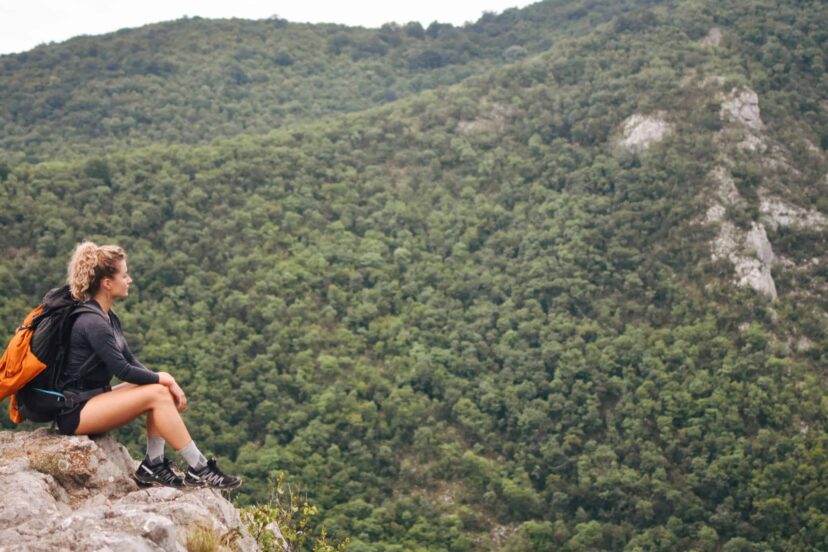
Coordination on Changing Surfaces
Hiking often involves encountering obstacles like fallen trees or crossing streams with slippery rocks. These unexpected challenges require coordination as you adjust your stride length and foot placement to maintain balance.
By repeatedly adapting to changing surfaces during hikes, your coordination skills gradually improve.
To make the most of hiking for enhancing balance and stability:
Invest in proper hiking boots: Good-quality hiking boots provide ankle support and traction on various terrains.
Gradually increase difficulty: Start with easier trails before progressing to more challenging ones.
Maintain a steady pace: Be mindful of your pace while hiking; rushing can compromise balance.
Stay hydrated: Proper hydration ensures optimal muscle function during hikes.
Consider glucose tolerance: Hiking can help regulate blood sugar levels by increasing glucose tolerance.
Hiking is a fun and effective way to enhance balance, strengthen core muscles, and improve coordination. By embracing the challenges of uneven terrain, you can develop better balance skills that extend beyond your hiking adventures. So lace up your boots, hit the trails, and reap the many health benefits that hiking has to offer!
Shed Pounds and Improve Fitness with Hiking:
Hiking is not only a great way to connect with nature, but it also offers numerous health benefits. If you’re looking to shed pounds and improve your fitness level, regular hiking sessions can be an excellent choice. Let’s explore how hiking can help you burn calories effectively, increase endurance levels, and provide a low-impact workout that promotes weight loss and overall fitness.
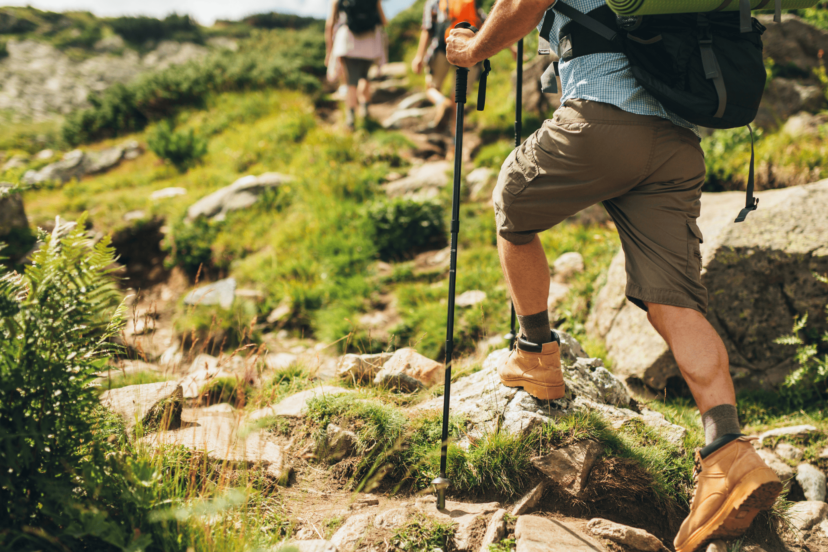
Burn Calories Effectively through Sustained Aerobic Exercise
One of the key benefits of hiking is its ability to burn calories effectively. When you hit the trails, your body engages in sustained aerobic exercise, which helps elevate your heart rate and boost metabolism. This continuous movement stimulates fat burning and enables you to shed those extra pounds.
Regular hiking sessions can have a significant impact on weight loss. The number of calories burned during a hike depends on various factors such as body weight, terrain difficulty, pace, and duration. On average, a person weighing 160 pounds can burn approximately 430-440 calories per hour while hiking.
Increase Endurance Levels over Time
Hiking provides an excellent opportunity to increase endurance levels gradually. As you continue to challenge yourself by gradually increasing the distance and difficulty of your hikes, your body adapts by improving its cardiovascular capacity.

By consistently pushing yourself further on each hike, you’ll notice a significant improvement in your stamina over time. What may have seemed like an arduous trek initially will become more manageable as your endurance increases.
Enjoy a Low-Impact Workout that Promotes Weight Loss
Unlike high-impact exercises such as running or intense gym workouts that put stress on joints and muscles, hiking offers a low-impact alternative for individuals seeking weight loss without excessive strain on their bodies.
The natural terrain acts as cushioning for joints while still providing an effective workout for muscles throughout the body. Hiking engages various muscle groups including the legs, core, and upper body, helping to tone and strengthen them.
Moreover, hiking is a refreshing change from the monotony of indoor workouts. Breathing in fresh air and being surrounded by nature can enhance your overall well-being, making the weight loss journey more enjoyable.

Increase Bone Density and Boost Brainpower
Strengthen Bones and Reduce the Risk of Osteoporosis
Hiking is not just a great way to explore nature; it also offers numerous health benefits. One significant advantage is its ability to strengthen bones and reduce the risk of osteoporosis.
Osteoporosis, a condition characterized by weak and brittle bones, affects millions of people worldwide. By engaging in weight-bearing exercises like hiking, you can improve your bone density and minimize the chances of developing this debilitating condition.
During a hike, your body bears its weight as you navigate different terrains. This weight-bearing exercise stimulates your bones to become stronger and denser over time.
As you walk uphill or traverse uneven trails, your skeletal system responds by adapting to the stress placed on it. This adaptation process leads to increased bone mineral density, making your bones more resilient and less prone to fractures.

Enhance Cognitive Function and Memory Retention
In addition to strengthening your bones, hiking also has remarkable effects on brain function. Engaging in physical activities like hiking can enhance cognitive function and memory retention. When you embark on a hike, various physiological changes occur within your brain that contribute to these positive effects.
Physical exercise increases blood flow throughout the body, including the brain. This improved circulation ensures that oxygen-rich blood reaches all parts of the brain, promoting optimal functioning. Moreover, hiking triggers the release of hormones such as endorphins and serotonin that are known for their mood-lifting properties.
The combination of increased blood flow and hormone release during a hike helps boost cognitive abilities such as focus, attention span, problem-solving skills, and creativity. So next time you find yourself struggling with mental fog or lacking inspiration, consider heading out for a rejuvenating hike in nature’s embrace.

Stimulate Creativity and Problem-Solving Skills through Nature’s Beauty
One unique aspect of hiking is its ability to stimulate creativity and problem-solving skills through exposure to nature’s beauty. When you immerse yourself in the great outdoors, you are surrounded by breathtaking landscapes, vibrant colors, and fascinating wildlife. This sensory experience has a profound impact on your brain.
Research suggests that spending time in nature can improve cognitive function related to creative thinking and problem-solving. The tranquility and serenity of natural surroundings allow your mind to wander freely and generate new ideas. It provides a much-needed break from the constant stimulation of modern life, allowing for mental clarity and fresh perspectives.
So, whether you’re facing a challenging project at work or seeking inspiration for an artistic endeavor, take a break from your routine and go hiking. Let nature’s beauty ignite your creativity and help you find innovative solutions to any problems that come your way.
Unplug from Technology and Reconnect with Nature through Hiking
Do you ever feel overwhelmed by the constant digital distractions that surround us? The beeping of notifications, the endless scrolling on social media, and the never-ending stream of emails can take a toll on our mental well-being. But fear not! There’s a simple solution to escape this digital overload and reconnect with nature: hiking.

Escape the constant digital distractions by immersing yourself in the tranquility of nature while hiking.
When you step into the great outdoors, something magical happens. The sounds of chirping birds replace the pings of incoming messages, and the gentle rustling of leaves drowns out the noise of technology. As you walk through forests and along winding trails, you’ll find yourself immersed in a world far removed from screens and keyboards.
Recharge your mental batteries by taking a break from screens and enjoying the peacefulness of natural surroundings.
Research has shown that spending time in nature can have a positive impact on our mental health. It allows us to recharge our mental batteries, reducing stress levels and improving overall well-being. When we disconnect from technology during hiking adventures, we give ourselves an opportunity to reset and rejuvenate.
Experience a sense of freedom and liberation as you disconnect from technology during hiking adventures.
Imagine being free from the constant need to check your phone or respond to emails. Hiking offers a chance to break free from these chains of technology and experience true liberation.
As you traverse rugged terrains, climb mountains, or explore hidden trails, you’ll feel a weight lifted off your shoulders. It’s like stepping into another world where time slows down, allowing you to fully appreciate the beauty around you.
So how can you incorporate more outdoor hikes into your life? Here are some ways to get started:
Make it a priority: Set aside dedicated time for hiking in your schedule.
Start small: Begin with shorter hikes and gradually increase the distance as you build stamina.
Find local trails: Research nearby hiking spots or join local hiking groups to discover new routes.
Take a friend: Hiking with a companion not only adds to the fun but also ensures safety.
Disconnect completely: Leave your phone behind or put it on airplane mode to resist the temptation of checking it.
Hiking is not just about physical exercise; it’s an opportunity to reconnect with nature and find solace away from technology. So lace up your boots, hit the dirt trails, and let the healing power of nature work its magic on your mind, body, and soul. Give yourself permission to unplug from technology and experience the incredible health benefits that hiking has to offer.

Reduce Stress and Anxiety through the Power of Hiking:
Lower Cortisol Levels with Stress-Reducing Activities
Engaging in stress-reducing activities, such as hiking, can have a profound impact on our well-being. One of the key benefits of hiking is its ability to lower cortisol levels. Cortisol is a hormone released by our bodies in response to stress, and chronically high levels can lead to various health issues.
By participating in activities like hiking, we can effectively reduce cortisol production and promote relaxation.
Nature’s Therapeutic Effects for Anxiety and Depression

Finding solace in nature has long been recognized for its therapeutic effects on mental health. Hiking offers an opportunity to immerse ourselves in the beauty of natural surroundings, which can alleviate symptoms of anxiety or depression. The serene atmosphere, fresh air, and scenic views work together to create a soothing environment that calms the mind and uplifts the spirit.
Mindfulness while Hiking for Stress Reduction
Practicing mindfulness while hiking adds another dimension to its stress-reducing benefits. Mindfulness involves focusing on the present moment without judgment or attachment to thoughts or worries.
When hiking mindfully, we direct our attention to the sensations of each step, the sounds of nature surrounding us, and the sights along the trail. This intentional focus helps us let go of stressors from daily life and fully immerse ourselves in the present experience, ultimately reducing stress and increasing overall well-being.
By incorporating these talking points into your hiking routine, you can tap into their powerful health benefits:
Engage in stress-reducing activities like hiking at least once a week.
Choose trails that offer scenic views or access to natural elements such as forests or waterfalls.
Practice deep breathing exercises during your hike to further enhance relaxation.
Consider joining a local hiking group or inviting friends along for added social support.
Take breaks during your hike to fully appreciate the natural surroundings and practice mindfulness.
Leave technology behind or limit its use to avoid distractions and fully immerse yourself in nature’s therapeutic effects.
Remember, hiking is not only a physical activity but also a mental journey. It allows us to reconnect with ourselves, find solace in nature, and reduce stress and anxiety. So lace up your hiking boots, embrace the power of the great outdoors, and let the healing benefits of hiking transform your well-being.

References:
Smith, A., & Wanless, S. B. (2019). The association between green space and mental health: A systematic review of longitudinal studies. International journal of environmental research and public health, 16(24), 1-19.
Loprinzi, P. D., Frith, E., Edwards, M. K., Sng, E., Ashpole, N., & Fisher, K. J. (2020). Physical activity intensity attenuates acute stress-induced physiological reactivity in adults: A randomized controlled trial study. Journal of science and medicine in sport, 23(6), 549-553.
Tsai HJ1 et al.
Strengthen Bonds and Foster Community through Hiking:
Build Stronger Relationships:
Embarking on shared hiking experiences can be a fantastic way to build stronger relationships with friends or family members. When you hit the trail together, you have the opportunity to connect on a deeper level while enjoying the beauty of nature.
Whether it’s conquering a challenging mountain hike or simply exploring local trails, the shared experience of hiking can create lasting memories and strengthen your bond with loved ones.
Connect with Like-Minded Individuals:
Hiking not only allows you to connect with nature but also provides an excellent opportunity to meet fellow hikers who share similar interests. The outdoor community is filled with people who are passionate about exploring trails and immersing themselves in nature.
By joining group hikes or participating in activities organized by organizations like REI, you can connect with like-minded individuals who appreciate the benefits of spending time outdoors.

Foster a Sense of Community:
Engaging in group hikes or volunteering for trail maintenance projects can contribute to fostering a sense of community within outdoor enthusiasts. Many urban areas have hiking groups that organize regular outings, allowing individuals from all walks of life to come together and enjoy their shared love for hiking.
These groups often promote inclusivity and welcome hikers of all ages and fitness levels, making it easy for anyone to join in on the fun.
Contribute to Local Hiking Community:
Volunteering for trail maintenance projects is not only a great way to give back but also an opportunity to actively contribute to the local community. By dedicating your time and effort towards maintaining trails, you ensure that future generations can continue enjoying these natural spaces.
From clearing overgrown vegetation to repairing damaged sections, every contribution helps preserve the beauty of our hiking trails.
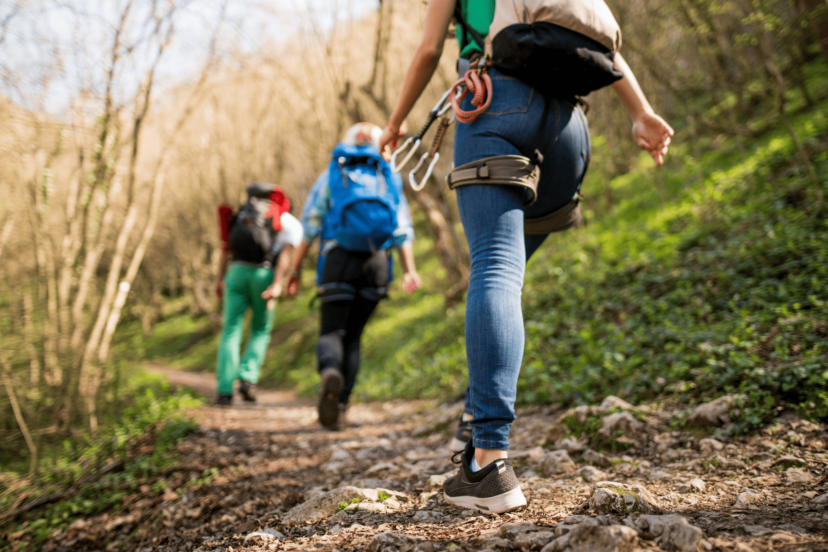
Embrace the Numerous Health Benefits of Hiking:
Physical Well-being:
Regular hiking offers a plethora of physical health benefits. It’s not just about getting from point A to point B; it’s an opportunity to boost your overall well-being. Here are some ways hiking can improve your physical health:
Cardiovascular Fitness: Hiking is an excellent form of aerobic exercise that gets your heart pumping and strengthens your cardiovascular system. By challenging yourself on various terrains, you can reduce the risk of heart disease and improve blood circulation.
Weight Management: Engaging in regular hikes helps burn calories, contributing to weight loss or maintenance. The varying intensity levels and inclines during hikes provide an effective way to shed those extra pounds.
Muscle Strength: As you navigate through different trails, your leg muscles work hard to propel you forward and maintain balance. Hiking uphill engages your glutes, quadriceps, and calves, while downhill descents strengthen your hamstrings.
Bone Density: Walking on uneven surfaces stimulates bone growth and increases bone density, reducing the risk of osteoporosis.
Mental Well-being:
Hiking not only benefits our physical health but also plays a vital role in enhancing our mental well-being:
Stress Relief: Spending time in nature has a calming effect on our minds, reducing stress levels and promoting relaxation. The serene surroundings help us disconnect from daily worries and find solace in the beauty around us.
Improved Cognitive Function: Studies have shown that spending time outdoors boosts cognitive function, attention span, creativity, and problem-solving skills. So why not take a hike when you need a mental boost?
Mood Enhancement: The release of endorphins during physical activity triggers feelings of happiness and euphoria – commonly known as the “runner’s high.” Hiking provides an opportunity to experience this natural mood enhancer while enjoying the great outdoors.
Reduced Risk of Depression: Engaging in regular physical activity, such as hiking, has been linked to a lower risk of depression and anxiety. The combination of exercise, fresh air, and natural surroundings can have a positive impact on our mental health.
Emotional Well-being:
Hiking offers emotional benefits that can contribute to overall happiness:
Increased Self-esteem: Overcoming challenges during hikes and reaching new heights can boost self-confidence and provide a sense of accomplishment.
Connection with Nature: Immersing oneself in nature allows for introspection and a deeper connection with the world around us. It provides an opportunity to appreciate the beauty of our environment and find solace in its simplicity.
Mindfulness Practice: Hiking encourages mindfulness by focusing on the present moment – the sounds, smells, and sights of nature. This practice helps reduce rumination and promotes mental clarity.
Social Well-being:
Hiking is not only a solitary activity; it can also be enjoyed with friends or as part of a group:
Bonding Opportunities:
Enhance Connection with Nature & Reduce Negative Thoughts through Hiking:
Spending time in nature has numerous health benefits, and hiking is a great way to immerse yourself in the beauty of the outdoors. Not only does it provide an opportunity for physical exercise, but it also offers a chance to enhance your connection with nature and reduce negative thoughts. Let’s explore how hiking can have a positive impact on your mental well-being.

Immerse Yourself in the Beauty of Nature
When you hike through lush forests or explore breathtaking national parks, you’re able to experience the wonders of nature firsthand. This immersion can evoke a sense of awe and wonder, which has been shown to have profound effects on our well-being. Studies have found that being surrounded by natural landscapes can elevate mood, reduce stress levels, and increase happiness.
Combat Negative Thoughts through Mindful Focus
One of the remarkable aspects of hiking is that it encourages us to be present in the moment. As we navigate trails and take in our surroundings, we naturally shift our attention away from negative thoughts or rumination.
Instead, we become deeply engaged with the sights, sounds, and scents around us. This mindful focus redirects our mind away from worries or problems, allowing us to find solace in the present.

Appreciate the Positive Impact of Nature
Hiking offers an opportunity to reconnect with the environment and develop a greater appreciation for its role in promoting mental well-being. Forest bathing, for example, involves immersing oneself in nature’s healing powers by mindfully absorbing its sights and sounds.
The greenery surrounding us during hikes provides not only visual pleasure but also fresh air that invigorates both body and mind.
Boost Memory Function
Research suggests that spending time outdoors can improve memory function. As you hike along trails or explore new terrains, your brain is continuously stimulated by new sensory experiences. This stimulation helps enhance cognitive abilities such as memory retention and recall.
So, if you find yourself struggling to remember things or feeling mentally fatigued, a hike in nature might be just what you need.
Help Alleviate Depression
Depression is a common mental health condition that can significantly impact daily life. Fortunately, hiking can be an effective complementary therapy for managing depression symptoms.
The combination of physical activity, exposure to natural surroundings, and the release of endorphins during exercise can help alleviate depressive feelings. It provides a natural mood boost and offers a change of scenery from the monotonous routines that often contribute to feelings of sadness.
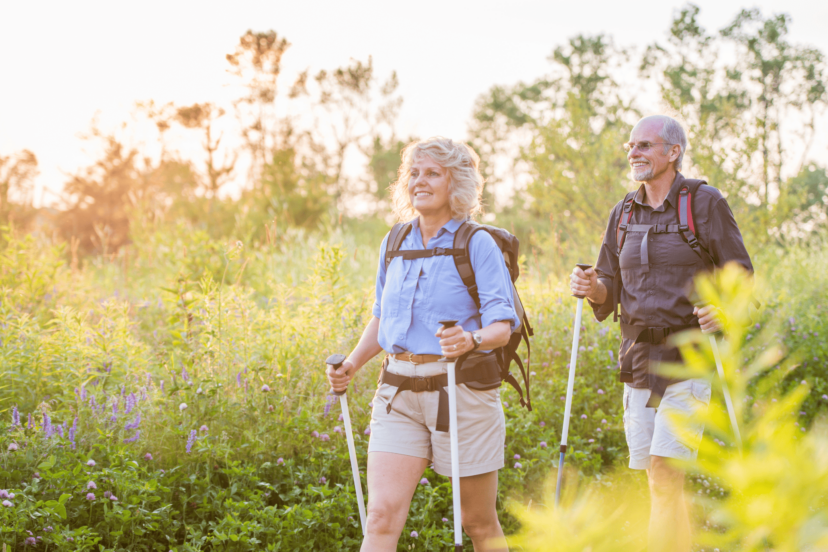
Embrace Your Surroundings
When we spend most of our time indoors or surrounded by concrete jungles, we miss out on the therapeutic effects of nature. Hiking allows us to escape the confines of our everyday lives and reconnect with something greater than ourselves. By embracing our surroundings through hiking, we tap into an innate connection that reminds us of our place in the world.
Conclusion: Embrace the Numerous Health Benefits of Hiking:
Hiking isn’t just about exploring nature or enjoying the great outdoors; it also offers a plethora of health benefits that can enhance your overall well-being. From physical fitness to mental clarity, hiking is a powerful activity that can transform your life in more ways than one.
Through hiking, you can experience significant physical benefits. It helps improve cardiovascular health by increasing your heart rate and strengthening your muscles. The varied terrain challenges your body and builds endurance, leading to improved fitness levels. Hiking aids in weight loss as it burns calories and boosts metabolism.
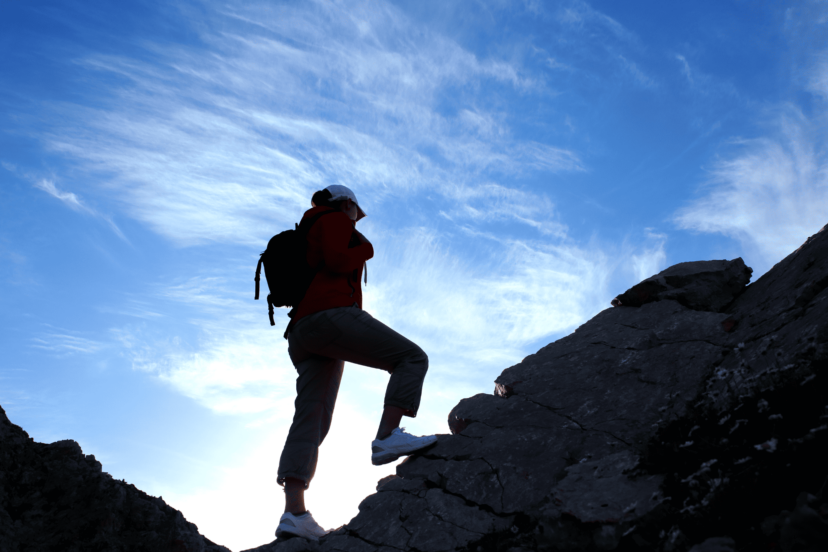
Beyond the physical advantages, hiking has remarkable mental and emotional benefits too. Spending time amidst nature reduces stress and anxiety while promoting relaxation. It allows you to unplug from technology and reconnect with the natural world, giving your mind a much-needed break from daily pressures.
Moreover, hiking enhances balance and stability as you navigate uneven terrains, contributing to better coordination skills. It also increases bone density, reducing the risk of osteoporosis and improving overall bone health. Studies have shown that spending time in nature improves brain function and cognitive abilities.
Hiking is not only a solitary activity; it can also be a social experience that fosters connections with others who share your love for the outdoors. Whether you hike with friends or join local hiking groups, it provides an opportunity to strengthen bonds and build a sense of community.
To fully embrace the numerous health benefits of hiking, make it a regular part of your routine. Set aside dedicated time for this invigorating activity and explore new trails whenever possible. Remember to dress appropriately, stay hydrated, and follow safety guidelines to make the most out of every hike.

So why wait? Lace up those boots, grab some snacks for the journey ahead, and embark on an adventure that will not only improve your physical fitness but also nourish your mind and soul. Start reaping the incredible rewards that hiking has to offer and experience a transformative journey towards a healthier, happier you.
FAQs:
1. Can hiking help with weight loss?
Yes, hiking can aid in weight loss as it burns calories and boosts metabolism. The varied terrain challenges your body, helping you shed pounds while enjoying the beauty of nature.
2. Does hiking improve mental well-being?
Absolutely! Hiking reduces stress and anxiety, promotes relaxation, and allows you to unplug from technology. Spending time in nature can have a positive impact on your mental well-being by providing a break from daily pressures.
3. Is hiking suitable for all fitness levels?
Hiking can be tailored to suit different fitness levels. Choose trails that match your abilities and gradually increase the difficulty as you build endurance and strength.
4. How often should I go hiking to see results?
Consistency is key. Aim for at least two to three hikes per week to see noticeable improvements in your physical fitness and overall well-being.
5. Can hiking improve bone health?
Yes, hiking helps increase bone density, reducing the risk of osteoporosis and improving overall bone health. The varied terrains encountered during hikes provide excellent opportunities for weight-bearing exercise.
6. Are there any precautions I should take before going on a hike?
Before heading out on a hike, ensure you are adequately prepared by wearing appropriate footwear and clothing, carrying enough water, and familiarizing yourself with the trail’s difficulty level. It’s also essential to inform someone about your plans and check weather conditions beforehand.
7. How do I find suitable hiking trails near me?
There are various resources available online that provide information about nearby hiking trails based on location, difficulty level, length, and scenic views. Websites such as AllTrails or local tourism boards are great places to start your search.



